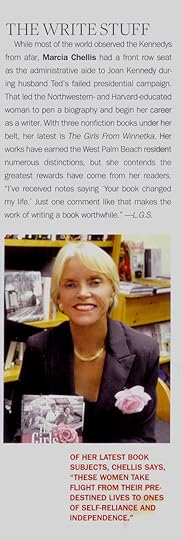Marcia Chellis's Blog
November 10, 2017
Radio Interview!
http://www.blogtalkradio.com/cutvnews...
February 11, 2017
Love Letters in the Sand

A Boston portrait painter unexpectedly meets an attractive wanderer who opens her eyes to the world, especially the Middle-East, and she becomes a woman she never could have imagined.
September 5, 2011
Palm Beach Illustrated September 2011 Issue
June 27, 2011
Stay-at-home Moms or Working Mothers?
In the New York Times Sunday Opinion on May 8, 2011, professor of history and author Stephanie Coontz from Olympia, Washington wrote "One of the most enduring myths about feminism is that 50 years ago women who stayed home full time with their children enjoyed higher social status and more satisfying lives than they do today. All this changed, the story goes on, when Betty Friedan published her 1963 best seller, 'The Feminine Mystique,' which denigrated stay-at-home mothers. Ever since their standing in soceity has steadily diminshed."
Later in the article she also writes, "Contrary to myth, 'The Feminine Mystique' and feminism did not represent the beginning of the decline of the stay-at-home mother, but a turning point that led to much stronger legal rights and 'working conditions' for her."
Do you agree?








April 14, 2011
Please write about your own experiences, your responses to “the girls'” stories, or something you’ve read that is relevant to their efforts to combine being a wife, mother, and professional.
I also read recently Virginia Postrel’s comments in her Wall Street Journal column remembering the “mommy track.” She recalled Felice Schwartz’s 1989 article in Harvard Business Review suggesting that women, leaving the corporate world to raise children, be given flexibility and part-time positions. Postrel noted that the idea was scoffed at, at the time, but two decides later millions of American women are combining “motherhood not just with jobs but careers.”


Please write about your own experiences, your responses to “the girls’” stories, or something you’ve read that is relevant to their efforts to combine being a wife, mother, and professional.
I also read recently Virginia Postrel’s comments in her Wall Street Journal column remembering the “mommy track.” She recalled Felice Schwartz’s 1989 article in Harvard Business Review suggesting that women, leaving the corporate world to raise children, be given flexibility and part-time positions. Postrel noted that the idea was scoffed at, at the time, but two decides later millions of American women are combining “motherhood not just with jobs but careers.”


Please write about your own experiences, your responses to "the girls'" stories, or something you've read that is relevant to their efforts to combine being a wife, mother, and professional.
I also read recently Virginia Postrel's comments in her Wall Street Journal column remembering the "mommy track." She recalled Felice Schwartz's 1989 article in Harvard Business Review suggesting that women, leaving the corporate world to raise children, be given flexibility and part-time positions. Postrel noted that the idea was scoffed at, at the time, but two decides later millions of American women are combining "motherhood not just with jobs but careers."








April 13, 2011
What’s the book all about?
But the girls have other ideas. While many of their friends gladly follow traditional paths, these women adapt deeply ingrained standards to what is happening around them. They take flight from their predestined lives to lives of self-reliance and independence. And, along with other women of their generation who hold similar visions, they leave a legacy of choices to the next generation of young women. After opening their hearts and revealing their secrets and life stories–which they describe as a powerful and rewarding experience–they encourage readers to journal about exceptional or significant moments in their lives.
.
What's the book all about?
But the girls have other ideas. While many of their friends gladly follow traditional paths, these women adapt deeply ingrained standards to what is happening around them. They take flight from their predestined lives to lives of self-reliance and independence. And, along with other women of their generation who hold similar visions, they leave a legacy of choices to the next generation of young women. After opening their hearts and revealing their secrets and life stories–which they describe as a powerful and rewarding experience–they encourage readers to journal about exceptional or significant moments in their lives.
.





















